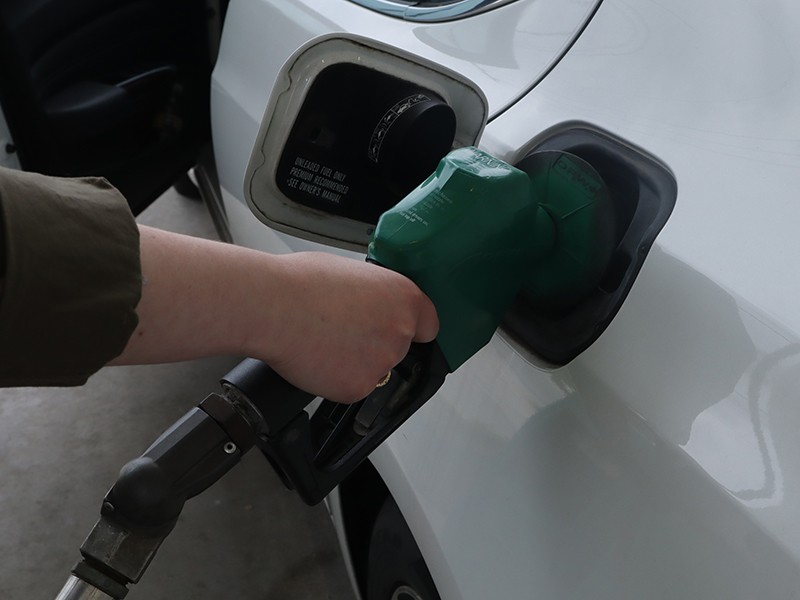While the price at the pump continues to climb, fuel experts are largely contributing the fluctuation in prices to three main factors: the price of crude oil, supply and demand and local taxes.
Zach Wall, vice president of Business Development for Mansfield Energy Corporation, said that the price of crude oil is the most fundamental of the three factors.
“The price of crude is going to be your baseline determining the price of refined products as consumers purchase them at the retail pump,” said Wall. “[The] reason being is because every gallon of gasoline is refined through a barrel of crude.”
But, Wall said that the price of crude oil is impacted by supply and demand, whether from an international and national perspective.
Montrae Waiters, spokeswoman for AAA – The Auto Club Group, said that the upcoming spring break season, coupled with a decreased supply of fuel, is creating the perfect storm.
“With increased demand and tighter gasoline supplies, we are looking at more expensive pump prices,” said Waiters. “We have spring break that is getting ready to come up and even though we’re in the midst of a pandemic, you still have many people who plan to travel.”
Waiters is supported by data from the Energy Information Administration, which shows that demand increased from 8.15 million barrels a day to 8.73 million barrels a day last week. This demand is the highest weekly record since November 2020.
On the other hand, domestic fuel supply is slowly but steadily increasing. According to Waiters, supply increased from 231.6 million barrels to 232 million barrels. She said that while this rate is still one of the lowest levels of 2021, refinery usage jumped from 69 percent to 76 percent.
“If crude oil sustains at the level that it is right now, especially as the refinery utilization process increases, we may look at the prices continuing to climb and may likely not see any relief until maybe April,” said Waiters.
Wall said that while the New York Market Exchange is primarily responsible for setting the baseline price of fuel in the U.S., local markets play a large role when it comes to moving fuel from one area to another. He said that the winter storms in Texas are a recent example.
“We’ve seen the effect of that cutoff supply ripple throughout the Midwest and Southeast as that product is not coming up the pipeline and being delivered to a market,” said Wall. “While the NYMEX baseline may be one number, to get it in the Southeast may be a lot more expensive because there’s just a lot less supply in the Southeast right now as a result of Texas.”
On an even more local level, Waiters said that oftentimes a county-imposed fuel tax can cause gas prices to be higher in some areas than others.
“When we talk about locally within the state, you have to look at local taxes, local gas taxes vary from county to county, city to city,” said Waiters.
Wall said that these additional taxes are common in areas where there are restrictions on the type of fuel that can be used, such as Atlanta.
“Atlanta, one, has a specialty blend of fuel that they required to be burned within city limits to limit emissions and pollution,” said Wall. “But they also have different taxes…your Fulton County tax which, just like property taxes, are typically going to be higher than they are in other outlying markets.”
While crude oil prices, supply and demand and local taxes are perhaps the largest factors effecting the price at the pump, Wall said that there are additional “technical” factors impacting cost.
He said individual retailers can also play a couple of roles in effecting gasoline costs. The term “rack to retail spread” refers to the process of retailers adding additional costs to the price of fuel to make a profit. Sometimes retailers will also keep their overall price at a certain point even as the cost of fuel drops to make a larger profit, a practice known as “sticky pump”.
Wall also addressed the belief that the price of gas directly correlates to a current presidential administration. He said that while the administration itself is usually not directly responsible for the price of fuel, market traders will base their actions off of an administration’s agenda.
“Traders may project that the price of fuel is going to rise in the future given the Biden administration’s new agenda, so they might start buying and selling at a rate that will drive the future’s price higher,” said Wall. “Our current prices are somewhat predicated on the future’s prices.”
While there is not an easy way for drivers to impact the cost of fuel, Waiters said that motorists can follow a couple of tips to ensure their fuel lasts longer. One of these tips is to keep a light carload on trips.
“Don’t load your car down with a bunch of items because it impacts the gas,” said Waiters.
Keeping up with vehicle maintenance also helps keep gas in the tank longer, according to Waiters.
“That includes, of course, making sure that your tire air pressures are where they need to be, because if you ride in a loaded down car, if your tires are not at their right air pressure…those are all factors that effect how much gas you burn on your road trip,” Waiters said.









